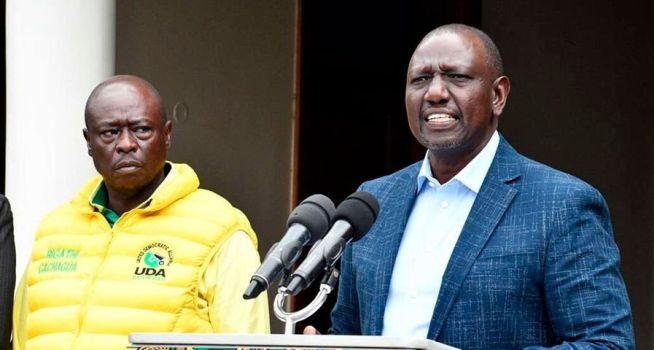The Mount Kenya region appears to be experiencing a submerged undercurrent of political betrayal, as a new political friendship is emerging among President William Ruto, Chief Cabinet Secretary Musalia Mudavadi, One Kenya Alliance leader Raila Odinga, and the leader of the Wiper party, Mr. Kalonzo Musyoka.
Analysts suggest that this budding friendship between these four political heavyweights may be driven by past political betrayals they endured under former presidents (late) Mwai Kibaki and Uhuru Kenyatta.
During his recent visit to the Nyanza region, which is Mr. Odinga’s political stronghold, President Ruto made a surprising statement by emphasizing that Odinga is not his political enemy, as many have interpreted it, considering they were co-founders of the ODM party in 2007.
“Jakom (Raila) is not my enemy. We are the ones who founded ODM in 2007. How then can I be his enemy?” Dr. Ruto asked, as he was cheered on by hundreds of Odinga’s supporters.
Read also:Optiven set to celebrate 24 years of Transforming communities
The emerging alliance between Ruto and Mudavadi seems to be indicated by Mudavadi’s elevation in his government, after appointing him as the Foreign Affairs Minister in the recent cabinet reshuffle.

On the other hand, Mr. Musyoka recently stated that he would recognize Dr. Ruto as Kenya’s President, by accepting the ongoing Reconciliation Talks held at Bomas in Nairobi.
Analysts suggest that these developments may be a clear sign that the four leaders are starting to come together politically.
However, their new cooperation is believed to be driven by the “betrayals” they experienced from the Mount Kenya region under former President Kibaki and President Kenyatta.
Political analyst James Waithaka points out that the Mount Kenya region seemed to betray Mr. Odinga in 2003 when President Kibaki turned away from him by not implementing the Memorandum of Understanding (MoU), where Odinga was expected to become the Prime Minister with executive powers after the two reformed the Constitution.
This happened despite Odinga supporting Kibaki with the “Kibaki Tosha” (Kibaki is enough) slogan during the 2002 general elections.

For Mr. Musyoka, analysts say he was betrayed by President Kibaki after Kibaki did not endorse him as his successor, despite Musyoka making numerous international visits to persuade foreign nations to support Kenya’s withdrawal from the Rome Statute, in light of the cases facing Mr. Kenyatta and Dr. Ruto at the International Criminal Court (ICC).
“Basically, President Kibaki said that Mr. Musyoka would be his successor, during a visit he made to Kitui County. This did not materialize,” Waithaka said.
President Kenyatta is also accused of betraying Mr. Mudavadi after turning against him in 2012, claiming that he “saw darkness” when he was signing a political agreement to support Mudavadi’s presidential bid in the 2013 general elections.

The betrayal of Dr. Ruto is the result of President Kenyatta not supporting him (Ruto) for the presidential candidacy in the August 9, 2022 elections, despite promising to support him after completing his two terms as President.
Due to these betrayals, analysts suggest that the closeness of these four leaders may be driven by the betrayals they experienced under the leadership of President Kibaki and President Kenyatta.
“As it stands, these four might unite to seek revenge against the Mount Kenya region because each of them has been betrayed in one way or another. That’s why we see Deputy President Rigathi Gachagua expressing anger because he understands the intricate political maneuvers working against the region,” Waithaka explained.







More Stories
Business case for FSC certification in Africa
Kenya and Switzerland Strengthen Ties in Refugee Empowerment and Education
Cracks in Opposition? ODM at 20 as Key Leaders Keep Off